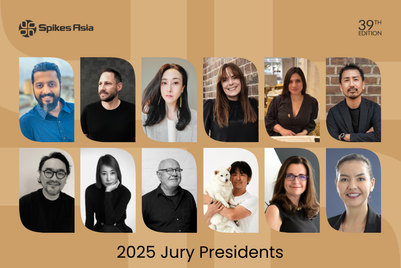
We talk about Gen Z, but they should really be called Gen C. This group, they’re challengers. They are socially and environmentally conscious digital natives who’ll only engage if we’re able to seamlessly fit into and add value to their lives.
They want to know what a brand’s challenger values and cultures are, because they know they’ll find alignment with brands that can embody them. And unlike Gen Z, they aren’t defined by their age. They could be 20, 40 or 80 and still challenge.
Here’s a look at how last week's Spikes Asia festival connected and should continue to connect with this group.
Traditional models are on the out
The notion of above and below the line is blurring. Today, the most successful live brand experiences are part of wider integrated campaigns.
Take a 100-person experience or stunt seen by 300 people. If they are complemented by the right PR and social strategies, they can reach hundreds of thousands of people. This was a trend at play at the event. We can’t operate in silos anymore as the most effective work is the sum of loads of moving parts and creative specialists.
Like with Cannes Lions, social good was a popular theme, and some of the best work wasn’t backed by big budgets. Instead it’s coming from the smaller independents who are working with clients who might have less cash to play with, but they are both aligned on their challenger-focused approach. And that’s powerful.
Let’s activate the creative
This year we saw digital wall displays, iPad viewing stations and print posters used to showcase the work. Cool to see there were interactive pieces and that people could get under the skin of these campaigns a bit more. I see there being opportunities to push the envelope further here, though.
Let’s activate. Imagine if attendees could experience the work – and the brands that are part of that work – in wholly immersive ways? We could re-create it as it originally appeared. TVC? Pull a branded physical activation together that speaks to the brand, and then show the ad within that space.
Brand experience? Bring the key components together, scale it down and have brand ambassadors take attendees on a journey through the different touchpoints. The reality is no one wants reality. No matter where people are, but especially when they are interacting with brands, they want to escape reality. These types of experiences can achieve that.
There are so many more ways that we can get creative with awards shows overall. These events celebrate creative work, so we should be looking for ways to push the boundaries, inspire, shock and educate from all angles. Let’s evolve the judging process, get delegates involved, and consider fresh new formats and approaches to celebrating creative work.
Do work that’s good
It’s not worth doing otherwise.
Not entering awards is like playing in a football team and not wanting to win the trophy. As a creative you work long and hard to pinpoint that key creative idea, and it doesn’t come overnight. There’s a bunch of things to consider – overarching brief, target audience, external social, cultural and political factors, what’s been done before, and the client’s openness to be brave and go for something off the cuff.
Our client’s buy-in and trust is key. We want to do good work for them, work that’ll exceed their objectives, work that challenges the status quo and captures the hearts and minds of their audiences. To receive recognition for this work among our peers? It’s the ultimate cherry on top.
Spikes Asia is really, really valuable because it celebrates good work and the creative craft, but as an industry we can’t be complacent. We’ve got a Gen C audience on our hands. One who expects us to constantly evolve and disrupt. Challenge accepted.
Adam Harriden is executive creative director at INVNT





.jpg&h=334&w=500&q=100&v=20250320&c=1)
.jpg&h=334&w=500&q=100&v=20250320&c=1)



.jpg&h=334&w=500&q=100&v=20250320&c=1)
.png&h=334&w=500&q=100&v=20250320&c=1)


.jpg&h=268&w=401&q=100&v=20250320&c=1)


.jpg&h=268&w=401&q=100&v=20250320&c=1)


